Share
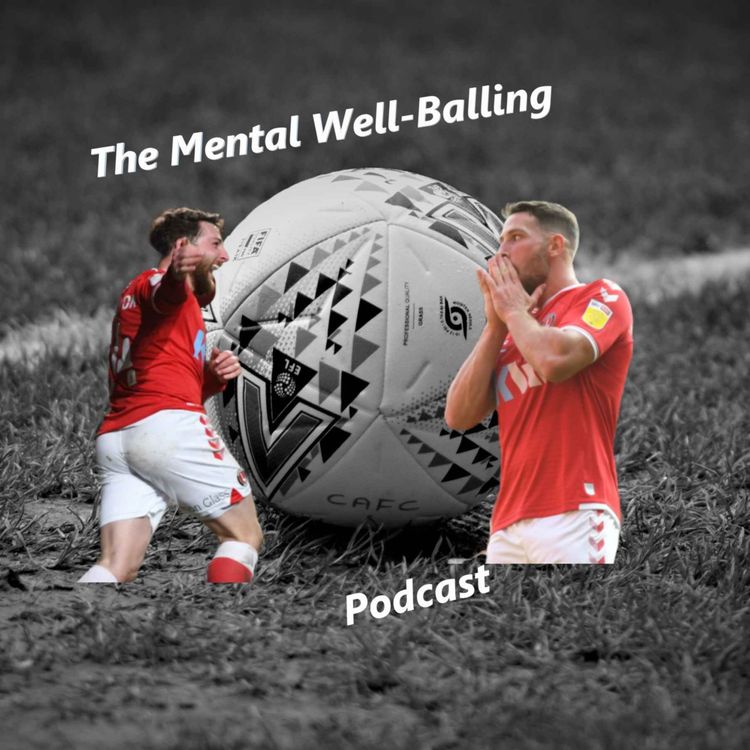
The Mental Well-Balling Podcast
Episode 16: Conor Washington
This week, we’re joined by Charlton Athletic and Northern Ireland international forward Conor Washington.
Conor took an unusual route into professional football, and approached it with an even more unusual mindset. Where most who enter the game have seen a career in football as an ambition, that was never really a goal for Conor. Never attached to an academy while growing up, he was relatively set on living what you might call a ‘normal’ life while playing for non-league St Ives Town in the United Counties League. Only when he was signed by Newport County at the age of 20, having plundered in plenty of goals in the lower reaches of non-league football, did a career in football seem plausible.
We talk about how his attitude towards football while growing up, different to many others in the game, has shaped him and how becoming a professional has not changed his identity, the overwhelming challenge that adapting to professional football posed, the testing elements that exist in player-fan relationships, as well as relationships within a dressing room that have been difficult to build given the restrictions in place as a consequence of the pandemic, the importance of sport psychology and developing conviction in himself as a footballer, and the fact that footballers are just real human beings.
If you’re new here, follow the podcast on Twitter and Instagram @WellBallingPod. Follow me on Twitter and Instagram @K_AndrewsPhotos, and most importantly of all, keep well, keep safe, and keep talking about mental health.
More episodes
View all episodes
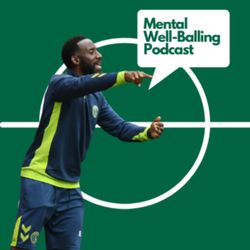
4. S2, Ep4: Jason Euell
01:14:51||Season 2, Ep. 4In this episode, we’re talking with former Charlton Athletic and Wimbledon forward Jason Euell, who has very recently found himself promoted to Charlton’s assistant boss on a caretaker basis at least. He’s another one that I’ve been wanting to speak to for a while, so it was very exciting to be able to do so, and he didn’t disappoint.We talk about the importance of simply asking “how are you?”, the role of a coach in the development of the life of a young individual beyond just making them a better player, how growing up in Wimbledon’s Crazy Gang contributed to a career in which he thrived under pressure, the way football became an escape around the period that he and his partner had to endure the trauma of losing a child following a still birth, his coaching philosophies and how he hopes to achieve more and more with patience over the course of time, and the differences between coaching at development level and first-team level.Jason is a lovely speaker. You’re engrossed by what he has to say.Follow the podcast on Twitter @WellBallingPod, follow me on Twitter @K_AndrewsPhotos, and don’t be afraid to ask any questions you might have about the podcast or myself.
3. S2, Ep3: Lawrie Wilson
01:12:38||Season 2, Ep. 3Former Stevenage, Charlton Athletic and Bolton Wanderers man Lawrie Wilson is the guest in this episode. Lawrie is someone I wanted to have on right from the start of series one; someone who seemed like a genuinely interesting and lovely guy, with a fascinating story and lots of little nuances that would make him fascinating to talk to.I was not wrong at all. Lawrie, now plying his trade at Billericay Town while pursuing interests outside of football, is definitely a really good guy and speaks really interestingly and thoroughly about himself, his career, and all things mental health and football.We discussed the overlap between mental and physical health, how his ability to understand his own strengths meant he was able to adapt to both dropping down and rising up the divisions, how Graham Westley, his manager while he was at a successful Stevenage side, and Chris Powell, his manager while he was at Charlton Athletic, put a high price on mental wellbeing, communication and understanding in slightly different ways, and we may have touched on an infamous song that was sung about him which Charlton supporters might be aware of.If you’re new here, follow the podcast on Twitter and Instagram @WellBallingPod. Follow me on Twitter and Instagram @K_AndrewsPhotos, and most importantly of all, keep well, keep safe, and keep talking about mental health.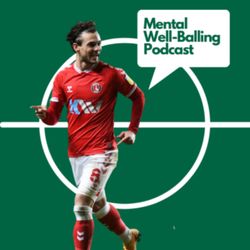
2. S2, Ep2: Jake Forster-Caskey
55:19||Season 2, Ep. 2We’ve got another fascinating guest for this episode of the podcast, who has been through some incredibly tough struggles over the past three years. Jake Forster-Caskey is currently recovering from a second ACL injury, suffered at the end of a season in which he felt he had found his peak again after recovering from the first.It was actually Jake who encouraged me to get the podcast going again and call it quits altogether after the first series. Walking around The Valley’s pitch during the final game of last season, just after I had photographed him receiving his deserved POTY trophy, he asked about being interviewed for the podcast. That was an opportunity I couldn’t pass down.It’s obviously taken some time for the interview to take place while Jake has gone through some of the more difficult stages of his recovery, but the strength he is showing at present to deal with the process he’s going through is incredible and shines through during our chat.We talk about how signing a pro-contract at 14 meant that his first exposure to pressure and criticism was particularly tough to take, as well as the support he received from his ex-professional father and step-father at the start of his career and his perception of mental health and its status within the game. Although, of course, much of our chat is centred around his injuries. We discuss the challenge of coming to terms with that first injury, how isolating an experience it is being outside the football bubble and being isolated from your teammates while you grind through the recovery process and how returning to training and kicking a ball around again is actually the toughest part of the process. We also look at the importance of having alternative focuses during the recovery process, how the experience of that first injury has led to him being able to manage the second one more efficiently and with less anxiety, and the strength required to overcome the down days that you can only expect to exist through a challenging journey of recovery. If you’re new here, follow the podcast on Twitter and Instagram @WellBallingPod. Follow me on Twitter and Instagram @K_AndrewsPhotos, and most importantly of all, keep well, keep safe, and keep talking about mental health.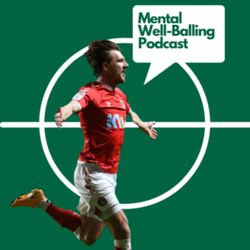
1. Series Two, Episode One: Alex Gilbey
59:59||Season 2, Ep. 1Well then, it’s been a while, hasn’t it? Welcome back to the Mental Well-Balling Podcast. A podcast in which football’s association with mental health and wellbeing is explored with the help of a guest from within the professional game.Things are going to be a little different, but only a tiny bit. It will no longer be weekly, and episodes will simply be released when opportunities arise and interviews have been recorded. Less pressure and hopefully content that isn’t rushed. We’ve also got a nice new graphic. I’d love to say I put some effort into that, but Canva is a lifesaver. It’s a bit brighter and hopefully gets across the style of the podcast a little more effectively. It views mental health positively. We get that positive message, particularly around the notion of self-realisation, overcoming moments of self-doubt and pushing forward, from our first guest of the new series, Charlton Athletic midfielder Alex Gilbey, who was kind enough to speak to me after recovering from a nasty battle of Covid, while also managing his recent entry into parenthood and a gold addiction. Among other themes, we chat about the regret he has over his attitude through his childhood despite making it as a footballer, coping with being the relegator – suffering three relegations in three seasons with three different clubs – how his relationship with Conor Washington has helped him throughout his career, the importance of having unity in dressing room and what that means of both mental wellbeing and performance, and how he suffered a crisis of confidence during the first six months of his time at Charlton and his success in overcoming that. Alex spoke excellently, being both really open and offering some great insight into some of the more nuanced elements of professional football. I hope you enjoy our chat. If you’re new here, follow the podcast on Twitter and Instagram @WellBallingPod. Follow me on Twitter and Instagram @K_AndrewsPhotos, and most importantly of all, keep well, keep safe, and keep talking about mental health.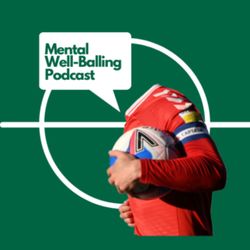
15. Episode 15: Joe Francis
01:08:47||Season 1, Ep. 15Our focus this week is on the nurturing of academy footballers that goes beyond simply developing them as footballers. There is a need to develop them as human beings, as rounded individuals, and to ensure they are mentally prepared to deal with life’s stresses as much as they are the stresses of football.Joe Francis, head of education and welfare at Charlton Athletic, lives and breaths with a desire to support young people. Young people. And that is key. To him, the young people that enter Charlton’s academy are exactly that. People first, footballers second.We talk about the importance of the language that needs to be used to ensure the mental wellbeing of those within the academy is protected, the personal development the club seeks to ensure takes place through its player care programme, the opportunities for education for players at academy level and beyond that is one of several options to avoid the development of a dangerous athletic identity, creating life-long relationships that don’t simply end once a player’s time in the academy is over, and the improvement that is happening across all academies as the focus on education and wellbeing intensifies.If you’re new here, follow the podcast on Twitter and Instagram @WellBallingPod. Follow me on Twitter and Instagram @K_AndrewsPhotos, and most importantly of all, keep well, keep safe, and keep talking about mental health.
Half-Time Talk: Harry Brooker
30:45|In this episode of Half-Time Talk, we’re chatting with Harry Brooker; a sports psychologist who provides some insight into the profession. We talk about how a sport psychologist can help a player achieve their maximum potential, the barriers that exist that prevent psychologists from accessing players and players from reaching out to psychologists, and the form sessions with psychologist might take. If you’re new here, follow the podcast on twitter and Instagram @wellballingpod, follow me on twitter and Instagram @k_andrewsphotos, keep well, keep safe, and keep talking about mental health.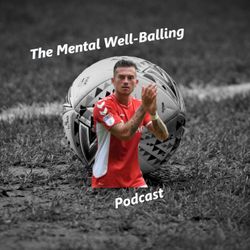
14. Episode 14: Lewis Page
44:56||Season 1, Ep. 14Exeter City left-back Lewis Page has been through an intense period of injury trauma over the past four years, and he joins us this week to chat about those experiences. The former Charlton Athletic man tells us about a challenging time which saw him miss 23 months of football, an inability to escape fears that a set-back would come even when things were looking promising during his recovery period, and the thoughts he had about quitting the game.But Lewis is now playing regularly again, and that’s come about through taking a care-free, all or nothing approach to trials at Plymouth and Exeter in the summer. He’s learnt to trust his body and enjoying football again. Follow the podcast on Twitter and Instagram @WellBallingPod, follow me on Twitter and Instagram @K_AndrewsPhotos, Keep well, keep safe, and keep talking about mental health.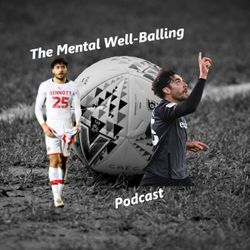
13. Episode 13: Matt Crooks
54:55||Season 1, Ep. 13This week, we're joined by Rotherham United midfielder Matt Crooks for what is a rather special episode both for me personally and for the stories and emotions you'll hear.When I began this podcast, I had a small list of people I wanted to speak to who were beyond those I was already connected to. Not necessarily big names, not necessarily those who had spoken about mental health problems before, but those who I either knew would have complex minds to unpick or they had had a significant impact on me and my life. Matt Crooks was on the top of that list.In addition to struggling with mental health problems throughout most of my life, I also suffer from epilepsy. I’ve looked for sources of support throughout those times where I’ve suffered the very worst of epilepsy’s effects. People who have achieved in their life despite living with it. I’ve looked to footballers, as someone whose life is dominate by the game naturally would. I found Matt Crooks. His successes in his career were also mine. Not because I’ve wanted to be a footballer, just that here’s someone making a success of themselves. Why can’t I be a success?To speak to Matt, to thank him for that, was wonderful enough. To speak in greater detail about epilepsy was a wonderful pleasure.We also speak about the terrible passing of his best friend, Jordan Sinnott, last year, but the incredible reaction he has helped to oversee following it. The Shirts for Sinnott campaign is something you can’t have missed if you spend any time on social media, and a foundation trust has been set up in his name since.Finally, there’s also time to talk about football and mental health more directly. The focus on mental health at his current club, Rotherham United, is much greater than many others.If you’re new here, follow the podcast on Twitter and Instagram @WellBallingPod. Follow me on Twitter and Instagram @K_AndrewsPhotos, and most importantly of all, keep well, keep safe, and keep talking about mental health.